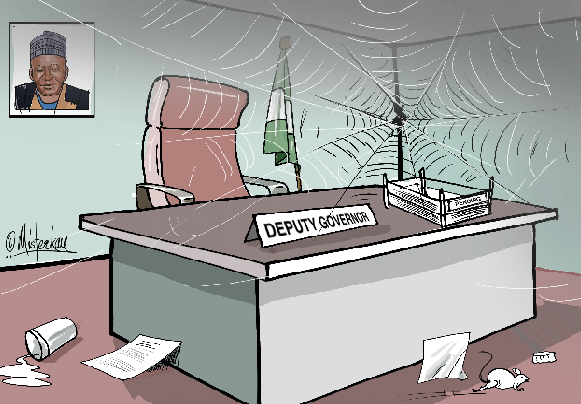in our clime, nations and subnationals are often held in leadership abeyance whenever the need arises for their ailing heads of government to spend weeks abroad on medical vacation. Inability to function in offices, either by natural causes or self-affliction, always happens at huge cost to the people who voted them.
Taraba State experienced something quite similar in 2012 when the late Governor Danbaba Suntai’s self-piloted Cessna 208 crashed near Yola Airport on approach. Although he survived, he faced serious health challenges that made it practically impossible for him to function effectively as governor. Yet, amid high-stakes politicking, he remained in office until his second term ended in 2015.
Deputy Governor Garba Umar was then sworn in as acting governor. Curiously, Umar served two years in acting capacity before the Supreme Court sacked him and reinstated Abubakar Danladi, the former deputy governor who had been impeached before Umar took over.
Governor then, now deputy
When Suntai’s accident occurred in October 2012, the ‘vacancy’ was at the governor’s office. Now, it is at the deputy governor’s office where the occupant of that coveted position, Alhaji Aminu Alkali, has been away from office on health grounds since November 2024.
According to media reports, the state Commissioner for Health said Alkali suffered a stroke that weakened one side of his body and impaired his speech. “But glory be to God, treatment is ongoing, and we are happy with his progress. We hope to welcome him back soon,” the Commissioner told the press.
Sadly, eight months after he left office to seek medical care, Alkali has still not recovered enough to resume office and discharge the duties for which the good people of Taraba State elected him. Like most Nigerians, I believe his health is paramount, and he deserves every available care. But something must be done about his prolonged absence to ensure governance does not suffer.
As expected, the continued absence of Alkali, who was elected on the same ticket with Governor Agbu Kefas, has generated reactions in and beyond the state. Understandably, there are concerns that Taraba has trudged through governance without an active deputy governor for more than eight months due to ill health. Yet no concrete measures have been taken to address his absence, suggesting a clear governance failure.
Blocking the gap
The situation in Taraba took an interesting twist with reports that the governor asked his Deputy Chief of Staff to oversee the affairs of the ailing deputy governor’s office. Calling this a mere stop‑gap measure is an understatement because the law does not explicitly provide for such an arrangement. In circumstances like this, recourse to the Constitution is the final resort.
What does the law say about a governor or deputy who is incapacitated? Does absence for more than eight months due to ill health amount to incapacitation? What role should the State House of Assembly play? Can the governor legitimately delegate a deputy’s office to an aide?
Our Constitution makes clear why the office of deputy governor exists. Chapter 6, Part II, Section 186 of the 1999 Constitution (as amended) provides for this office and places it at the core of the state’s executive structure. Without a deputy, oversight of key ministries may suffer, while the governor becomes overburdened. Normally, an absentee deputy shifts too much power to a single office and weakens democratic safeguards.
At the state level, the deputy governor’s office is second only to that of the governor. To underscore its importance, the law requires that every gubernatorial candidate must have a running mate who, upon victory, becomes the deputy governor. Yet our Constitution remains stubbornly silent on specific provisions for a clearly defined role for the deputy governor, despite the clear necessity of the office.
The lack of explicit constitutional provisions for the office of a deputy governor notwithstanding, will it be correct to assume that someone who is out of office for eight months of the four years he was elected to serve on grounds of ill health is incapacitated?
The 1999 Constitution (as amended) is explicit about procedures when a governor is incapacitated. I am not saying Deputy Governor Alkali is incapacitated since there is no medical report publicly available to that effect. However, his prolonged absence demands the establishment of a panel to ascertain his health status and determine whether he should continue to hold office.
The issues at stake in Taraba are diverse: governance, accountability, and constitutional implications. And the question begging for an answer is: how long is too long for a public servant to be absent from office?
Way forward
While I join Taraba citizens and other Nigerians in praying for Deputy Governor Alkali’s swift recovery, it is imperative to remind not only the governor but also the State Assembly that if the deputy is unable to perform his duties owing to illness, then the constitutional process must be activated to install a new occupant so governance does not suffer.
The House of Assembly, in conjunction with the State Executive Council, must invoke the relevant constitutional provisions and take the necessary steps. Taraba State does not deserve to be without a deputy governor for this long.
After all is said, the state government has two options: provide formal status updates through a public medical review with a clear timeline for the deputy governor’s return, or commence the constitutional process to appoint a replacement, while continuing to support Alkali’s access to quality healthcare.
Like most Taraba citizens and other Nigerians, I pray that God grants Deputy Governor Alkali a speedy recovery. I sympathise with him. However, sympathy is no substitute for transparency or functional governance. It’s time for clarity and accountability.





